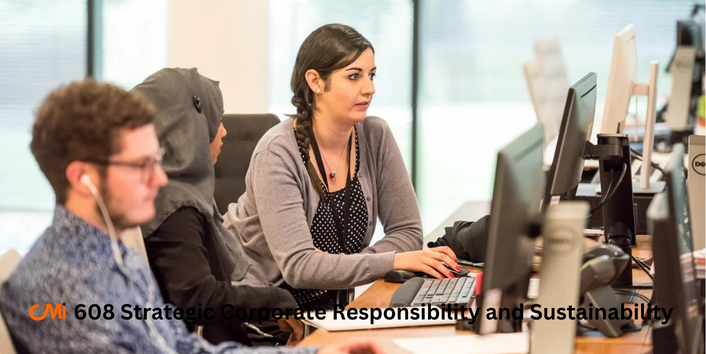CMI 608 Strategic Corporate Responsibility and Sustainability
- February 16, 2023
- Posted by: Scarlett
- Category: CMI Level 5

Table of Contents
CMI 608 Strategic Corporate Responsibility and Sustainability is a course designed to equip learners with the skills and knowledge necessary to understand the principles of corporate responsibility and sustainability and how they can be integrated into organisations’ strategic planning. The course covers various corporate responsibility and sustainability aspects, including social and environmental impact, ethics and governance, stakeholder engagement, and sustainable business practices. In today’s world, corporate responsibility and sustainability have become increasingly important for organisations of all sizes and industries. Businesses are expected to operate in a sustainable and ethical way, ensuring that they not only create value for their shareholders but also for their wider stakeholders, including employees, customers, suppliers, and the community at large. This course aims to help learners understand the importance of corporate responsibility and sustainability and how it can contribute to the long-term success of an organisation. By completing this course, learners will be able to understand the principles and practices of corporate responsibility and sustainability, develop a strategic approach to integrating these principles into an organisation’s operations, and effectively communicate its commitment to sustainability to its stakeholders. With this knowledge and expertise, learners will be equipped to positively impact the organisation’s performance and contribute to the broader goal of creating a sustainable future for all.
Aims of unit
Corporate Social Responsibility (CSR) and sustainability are critical topics that are closely linked to an organisation’s accountability. Organisations are increasingly held responsible for their social, environmental, and ethical impact, and their approach to managing and leading CSR and sustainability is a key determinant of their success. However, the definitions and approaches taken to manage and lead CSR and sustainability can vary depending on the type and purpose of an organisation and its governance. In general, organisations approach CSR and sustainability by developing aims and objectives, policies, and strategies to address the impact of their activities on society and the environment and their commitment to ethical and responsible conduct. This approach aims to ensure that the organisation operates sustainably and socially responsibly and creates value for all stakeholders. The CMI 608 Strategic Corporate Responsibility and Sustainability unit is designed to help professional managers and leaders understand CSR and sustainability in an organisational context. Through this unit, learners will assess the enablers, constraints, and barriers to the success of CSR and sustainability, present a case for organisational engagement, identify approaches for its implementation, and ultimately, identify strategies to gain ongoing stakeholder commitment. Overall, this unit aims to equip learners with the knowledge and skills necessary to understand the importance of CSR and sustainability in an organisational context and develop effective strategies for its implementation. This will enable professional managers and leaders to create sustainable and socially responsible organisations that positively impact the environment, society, and the economy.
What you’ll learn
CMI 608 Strategic Corporate Responsibility and Sustainability is a course designed to help learners understand the principles and practices of corporate responsibility and sustainability and how they can be integrated into organisations’ strategic planning. The course covers various corporate responsibility and sustainability topics, including social and environmental impact, ethics and governance, stakeholder engagement, and sustainable business practices. By completing this course, learners will be able to:
- Understand the principles and practices of corporate responsibility and sustainability and their importance in an organisational context.
- Assess the enablers, constraints, and barriers to the success of corporate responsibility and sustainability.
- Develop a strategic approach to integrating corporate responsibility and sustainability into an organisation’s operations.
- Identify sustainable business practices that can help the organisation operate in a socially responsible and environmentally sustainable manner.
- Understand the importance of stakeholder engagement and develop strategies to gain ongoing stakeholder commitment to the organisation’s sustainability goals.
- Communicate the organisation’s commitment to sustainability to its stakeholders effectively.
- Develop a framework for monitoring and evaluating the organisation’s sustainability performance over time.
This course aims to provide learners with the knowledge and skills necessary to lead and manage sustainable and socially responsible organisations that create value for all stakeholders. The course is suitable for managers and leaders from all industries and sectors interested in developing a strategic approach to corporate responsibility and sustainability.
What are the possible outcomes?
The outcomes of studying CMI 608 are numerous and can include the following:
- Understand corporate social responsibility and sustainability in organisational contexts.
- Know how corporate social responsibility and sustainability are applied in an organisational setting.
How can we help?
CMI Assignment Help can provide a range of services to successfully help students complete their CMI 608 Strategic Corporate Responsibility and Sustainability assignment. Here are some ways in which CMI Assignment Help can assist learners:
- Understanding the requirements: CMI Assignment Help experts can help learners understand the assignment’s requirements and develop a clear understanding of the topics covered in the unit.
- Research and analysis: Our experts can help learners conduct research on relevant topics, gather data, and analyse information to support their arguments and recommendations.
- Developing the structure and format: CMI Assignment Help can help learners develop a clear structure and format for their assignment that meets the requirements of the unit and is easy to follow.
- Writing and editing: Our experts can help learners write clear and concise content that meets the standards of academic writing. They can also provide editing services to ensure that the assignment is free from grammatical errors, spelling mistakes, and other issues that may impact the quality of the work.
- Referencing and citation: CMI Assignment Help can assist learners in citing their sources and referencing the assignment appropriately, ensuring that the work is properly documented.
Overall, CMI Assignment Help can provide the guidance and support necessary for learners to successfully complete their CMI 608 Strategic Corporate Responsibility and Sustainability assignment. In addition, our experts can help students achieve high grades and develop the skills and knowledge necessary to excel in their careers as managers and leaders.
Resources
- Barth, R., and Wolff, F. (2009). Corporate Social Responsibility in Europe. Rhetoric and Realities. Cheltenham: Edward Elgar Publishing Ltd.
- Beal, B.R. (2013). Corporate Social Responsibility: Definition, Core Issues, and Recent Developments. Thousand Oaks, CA: SAGE Publications.
- Beer, M., and Eisenstat, R.A. (2004). How to have an honest conversation about your business strategy. Harvard Business Review, 82(2): 82-89.
- Bigg, T. ed. (2004). Survival for a small planet: the sustainable development agenda. Abingdon, Oxon: Routledge.
- Blackburn, W.R. (2016). The Sustainability Handbook: The Complete Management Guide to Achieving Social, Economic and Environmental Responsibility. Abingdon, Oxon: Routledge.
- Blowfield, M., and Murray, A. (2014). Corporate Responsibility. 3rd ed. Oxford: OUP.
- Brown, L. (2010). Plan B 4.0: Mobilising to Save Civilisation. Washington D.C.: Earth Polar Institute/ W.W. Norton & Co.
- Bruel, O. (2017). Strategic Sourcing Management: Structural and Operational Decision Making. Kogan Page.
- Carroll, A.B. (1979). A Three-Dimensional Conceptual Model of Corporate Social Performance. Academy of Management Review. 4(4), 497-505.
- Choi, T-M., and Cheng, T.C.E. eds. (2015). Sustainable Fashion Supply Chain Management: From Sourcing to Retailing. Cham, Switzerland: Springer.
- Crane, A., McWilliams, A., Matten, D., Moon, J., and Siegel, D.S. (2009). The Oxford Handbook of Corporate Social Responsibility. Oxford: OUP.
- Crane, A., Matten, D., and Spence, L. eds. (2013). Corporate Social Responsibility. Readings and Cases in a Global Context. Abingdon, Oxon: Routledge.
- Elkington, J. (1999). Cannibals with Forks: The Triple Bottom Line of 21st Century Business. Chichester: Capstone Publishing Ltd.
- Eweje, G., and Bathurst, R. (2018). CSR, Sustainability, and Leadership. Abingdon, Oxon: Routledge.
- Falck, O., and Heblich, S. (2007). Corporate Social Responsibility: Going well by doing good. Business Horizons, 50(3): 247-254.
Related Articles:
FAQ
What is CMI 608, and what does it cover?
CMI 608 is a course focused on strategic corporate responsibility and sustainability. The course explores the principles and practices of corporate social responsibility (CSR) and sustainable business strategies. It examines how organizations can integrate ethical, social, and environmental considerations into their business operations to create positive impacts on society and the environment while ensuring long-term business success.
Why is strategic corporate responsibility and sustainability important for businesses?
Strategic corporate responsibility and sustainability are essential for businesses to operate responsibly, meet stakeholder expectations, and contribute positively to society and the environment. Embracing CSR and sustainability practices can enhance a company’s reputation, attract socially conscious customers, investors, and employees, mitigate risks, and foster long-term business resilience.
What are some common CSR initiatives and sustainability practices covered in CMI 608?
CMI 608 may cover a wide range of CSR initiatives and sustainability practices, such as environmental stewardship (e.g., reducing carbon footprint, resource conservation), social impact programs (e.g., community development, employee well-being), ethical supply chain management, diversity and inclusion initiatives, fair labor practices, and transparent corporate governance.
How can organizations develop a strategic approach to corporate responsibility and sustainability?
Developing a strategic approach to corporate responsibility and sustainability involves aligning CSR initiatives with the organization’s overall business strategy. This includes setting clear sustainability goals, integrating CSR into decision-making processes, engaging stakeholders, conducting materiality assessments to identify relevant sustainability issues, and measuring and reporting on progress.
What role does stakeholder engagement play in CSR and sustainability efforts?
Stakeholder engagement is critical in CSR and sustainability efforts as it allows organizations to understand the expectations, concerns, and interests of various stakeholders, such as customers, employees, investors, suppliers, communities, and NGOs. By involving stakeholders in the decision-making process, organizations can ensure that their CSR initiatives are meaningful, relevant, and impactful.
How does CMI 608 address emerging trends and challenges in CSR and sustainability?
CMI 608 likely covers emerging trends and challenges in CSR and sustainability to prepare students for the dynamic business landscape. This may include discussions on climate change and environmental risks, ethical considerations in technology and AI, the role of businesses in addressing social justice issues, and evolving regulations related to sustainability reporting and disclosures.
How can businesses measure the impact of their CSR and sustainability efforts?
Measuring the impact of CSR and sustainability efforts is crucial for assessing progress and identifying areas for improvement. CMI 608 may introduce various measurement tools and frameworks, such as the Global Reporting Initiative (GRI) standards, the United Nations Sustainable Development Goals (SDGs), and other impact assessment methodologies to help businesses track and report on their sustainability performance.
Why Choose Us?
- GPT Zero
- 100% Non-plagiarised Papers
- Dedicated human resource writers
- 24/7 /365 Service Available
- Affordable Prices
- Money-back and Privacy guarantees
- Unlimited Amendments upon request
- Satisfaction guarantee
